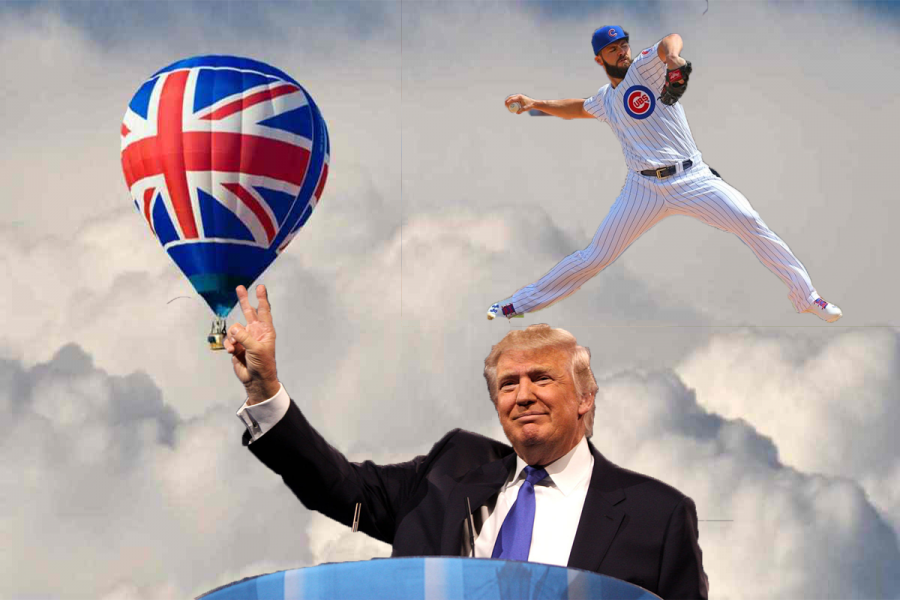Editorial: Reaching the impossible
The seemingly impossible events of the past year prove our power to change things
November 21, 2016
The Chicago Cubs won its first World Series in 108 years, and a candidate with no political experience was elected president. The Panama Papers have held many of the world’s seemingly invincible leaders accountable for their actions.
Great Britain, a formerly central power in one of the most successful unions of recent history, elected to leave the European Union, causing the resignation of its prime minister and leaving its future in doubt. A rapid series of coordinated terrorist attacks and lone wolf strikes shocked the world. Turkey, a bastion of stability in the Middle East, experienced a coup, leaving a political system fractured by conflict and a leader with more incentive to wield his iron fist.
In the face of such momentous, unexpected and often disheartening change, no one could blame us for feeling scared or helpless. But we can’t use tremendous change as an excuse for inaction; it is a chance to make a positive difference on the world.
When we study revolutions and great events in history (The Great Depression, World War II, the Civil Rights movement, the Cold War), they seem almost inexplicable. These events, and the people who experienced and caused them, feel removed from us, fossilized in time.
To our children and grandchildren, we are those people in history, and the consequences of our actions are the ones they’ll study. If this year has taught us anything, it’s that the seemingly impossible is not only possible, but probable.
Astounding things can happen, so it’s up to us to act now so that they’re the things we want. Climate change needs our action now. Political gridlock persists. Cancer has yet to be cured.
Stay optimistic; precedents have shown that things DO get better. Change is gradual, and optimism keeps the ball rolling.
This piece was originally published in the pages of the Winged Post on November 16, 2016.


















![“[Building nerf blasters] became this outlet of creativity for me that hasn't been matched by anything else. The process [of] making a build complete to your desire is such a painstakingly difficult process, but I've had to learn from [the skills needed from] soldering to proper painting. There's so many different options for everything, if you think about it, it exists. The best part is [that] if it doesn't exist, you can build it yourself," Ishaan Parate said.](https://harkeraquila.com/wp-content/uploads/2022/08/DSC_8149-900x604.jpg)




![“When I came into high school, I was ready to be a follower. But DECA was a game changer for me. It helped me overcome my fear of public speaking, and it's played such a major role in who I've become today. To be able to successfully lead a chapter of 150 students, an officer team and be one of the upperclassmen I once really admired is something I'm [really] proud of,” Anvitha Tummala ('21) said.](https://harkeraquila.com/wp-content/uploads/2021/07/Screen-Shot-2021-07-25-at-9.50.05-AM-900x594.png)







![“I think getting up in the morning and having a sense of purpose [is exciting]. I think without a certain amount of drive, life is kind of obsolete and mundane, and I think having that every single day is what makes each day unique and kind of makes life exciting,” Neymika Jain (12) said.](https://harkeraquila.com/wp-content/uploads/2017/06/Screen-Shot-2017-06-03-at-4.54.16-PM.png)








![“My slogan is ‘slow feet, don’t eat, and I’m hungry.’ You need to run fast to get where you are–you aren't going to get those championships if you aren't fast,” Angel Cervantes (12) said. “I want to do well in school on my tests and in track and win championships for my team. I live by that, [and] I can do that anywhere: in the classroom or on the field.”](https://harkeraquila.com/wp-content/uploads/2018/06/DSC5146-900x601.jpg)
![“[Volleyball has] taught me how to fall correctly, and another thing it taught is that you don’t have to be the best at something to be good at it. If you just hit the ball in a smart way, then it still scores points and you’re good at it. You could be a background player and still make a much bigger impact on the team than you would think,” Anya Gert (’20) said.](https://harkeraquila.com/wp-content/uploads/2020/06/AnnaGert_JinTuan_HoHPhotoEdited-600x900.jpeg)

![“I'm not nearly there yet, but [my confidence has] definitely been getting better since I was pretty shy and timid coming into Harker my freshman year. I know that there's a lot of people that are really confident in what they do, and I really admire them. Everyone's so driven and that has really pushed me to kind of try to find my own place in high school and be more confident,” Alyssa Huang (’20) said.](https://harkeraquila.com/wp-content/uploads/2020/06/AlyssaHuang_EmilyChen_HoHPhoto-900x749.jpeg)







